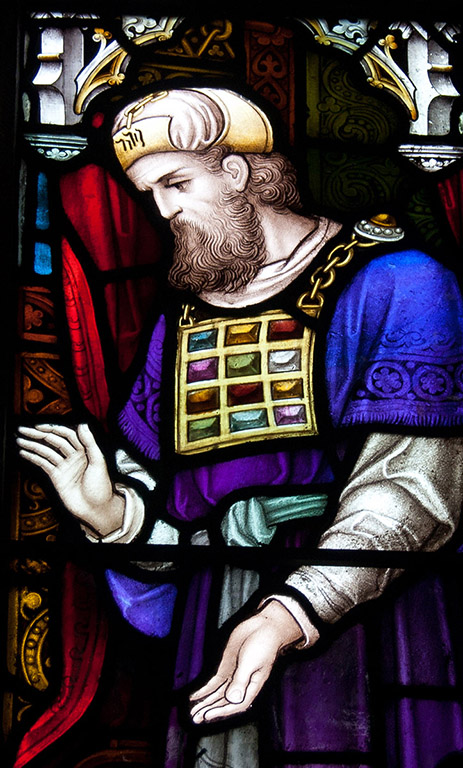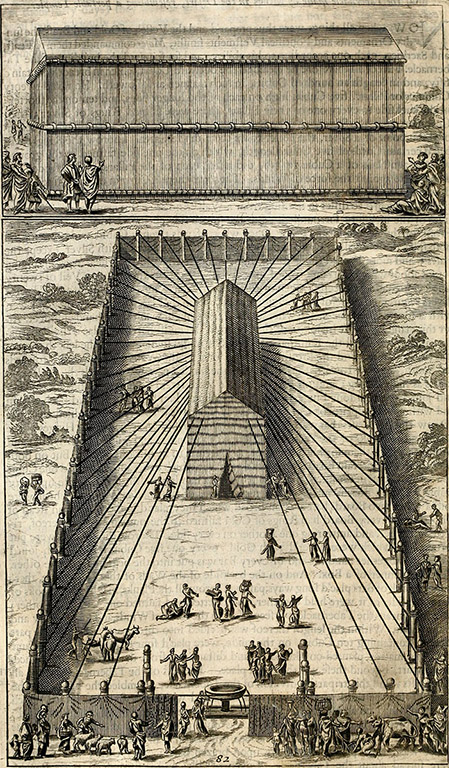Rev Dr Chris Wright is Global Ambassador of Langham Partnership (www.langham.org), the author of many books including commentaries on Exodus, Deuteronomy, Jeremiah, Lamentations and Ezekiel, and is a Senior Research Fellow of the KLC.
When God tells Moses that he has chosen Bezalel and Oholiab to supervise the mammoth task of constructing the tabernacle, it injects a winsome moment of down-to-earth practicality into the narrative. All these beautiful textiles and embroidery, carved wood and moulded metals, leatherwork, engraved precious stones, etc. – they would not just arrive like the manna from heaven. They needed human skills, human planning, human art and craftsmanship. And God provides it in the form of people he had already prepared with just such skills as part of their ordinary humanity.
Spirit-filled work
We must appreciate the role of the Spirit of God in such earthly tasks. If ever we are tempted to “spiritualize” the work of the Holy Spirit as concerned only with the non-material world, or the “sanctification of our souls,” we should remember Bezalel and Oholiab.
Being filled with the Spirit is something many Christians aspire to, though not many Christians expect the experience to do for them what it did for Bezalel and Oholiab. What did the filling of God’s Spirit do in their lives? It enabled them to be craftsmen, working in metal and wood and precious stones, and all kinds of artistic design – and to be able to teach others the same skills.
…
Putting these things together like this gives great dignity to such skills. I love the fact that on this first occasion when the Spirit of God, which had been so active in all the wonderful craftsmanship of creation itself, is said to fill a human being, it is to enable that person to exercise the same kinds of delegated skills.

There is something so wonderfully creative (and therefore God-like) in what this passage describes: craftsmanship, artistic design, embroidery with rich colours, carving wood and stone. I fondly wish I had some of these skills and greatly admire the work of artists who do. We should take seriously that these things are said to be marks of the filling of God’s Spirit. Of course, Bezalel and Oholiab were so filled for the purpose of working on the tabernacle – the holy tent of God’s presence among his people. But I don’t think we need to limit the action of God’s Spirit in this gifting only to “sacred” purposes. Presumably Bezalel and Oholiab had these skills as gifts from God’s Spirit and exercised them in ordinary life before and after they were employed in constructing the tabernacle.

The creation narrative … portrays God himself as the universal master craftsman who rejoices in the goodness and beauty of all he has so wonderfully designed and executed. This text encourages us to believe that the same Spirit of God who was at work in creation is also at work in that same wider sense, in all those who, as human beings made in God’s image, enrich our world with all kinds of creativity in art, music, colourful design, beautiful craftsmanship [etc.] … When we honour and admire such art, we give glory to the Spirit who empowers it.[1]
No sacred-secular dichotomy
We should also notice the way these so-called “secular” skills are put to work within the realm of the “sacred.” Or rather – the fact that there is no dichotomy between them. The God who will sanctify the tabernacle and its priests is the same God whose Spirit will enable “ordinary” Israelites to build the tabernacle and clothe the priests by the use of their everyday workmanship. Indeed, Zechariah foresaw the day when the words that were inscribed on the medallion on the high priest’s forehead, “Holy to the LORD,” would describe every ordinary part of life (Zech 14:20–21).
If this was so in Old Testament times, how much more should it govern our thinking in the light of our calling as a whole community to be God’s priesthood, and the temple of God’s dwelling. God has hallowed all of life and all creation and all work. For the earth is the Lord’s and it is the Lord Christ we are serving in every area of life (Eph 6:5–8; Col 3:22–24).
There is a very urgent missional need to eradicate the paralysing “sacred-secular dichotomy” that deceives so many Christians into an exaggerated view of “God’s work” (in the church, or paid for by the church) and a negatively diminished view of their “secular work” as of little value to God and God’s kingdom.
The Cape Town Commitment, the statement of the Third Lausanne Congress on World Evangelism 2010, addressed this very pointedly.
The Bible shows us God’s truth about human work as part of God’s good purpose in creation. The Bible brings the whole of our working lives within the sphere of ministry, as we serve God in different callings. By contrast, the falsehood of a “sacred-secular divide” has permeated the Church’s thinking and action. This divide tells us that religious activity belongs to God, whereas other activity does not. Most Christians spend most of their time in work which they may think has little spiritual value (so-called secular work). But God is Lord of all of life. “Whatever you do, work at it with all your heart, as working for the Lord, not for men,” (Colossians 3:23) said Paul, to slaves in the pagan workplace.
Paul has said, “I know, and am persuaded by the Lord Jesus, that there is nothing unclean of itself.”… The Lord has cleansed your houses, my brothers and sisters; He has cleansed your bed chambers, your tables, your shops; He has made the bells upon your horses holiness to the Lord! He has made the common pots and pans of your kitchens to be as the bowls before the altar if you know what you are, and live according to your high calling. You housemaids, you cooks, you nurses, you plowmen, you housewives, you traders, you sailors – your labour is holy if you serve the Lord Christ in it, if by living unto Him as you ought to live! The sacred has absorbed the secular! The overarching temple of the Lord covers all your houses and your fields! My brothers and sisters, this ennobles life!… This ensures us a reward for all we do![2]
[1] Christopher J. H. Wright, Knowing the Holy Spirit Through the Old Testament (Downers Grove: InterVarsity Press, 2006), 37–39.
[2] All for Jesus! Sermon #1205, Metropolitan Tabernacle Pulpit, vol. 20. Accessed March 2, 2018, https://www.spurgeongems.org/vols19–21/chs1205.pdf

This essay is an extract from Chris’s commentary, Exodus, in The Story of God Commentary (Grand Rapids: Zondervan, 2021), 541–544.
The Kirby Laing Centre for Public Theology in Cambridge. Charity registered in England and Wales. Charity Number: 1191741
Kirby Laing Centre, The New Mill House, Unit 1, Chesterton Mill, French’s Road, Cambridge, CB4 3NP
© 2022 The Kirby Laing Centre for Public Theology in Cambridge